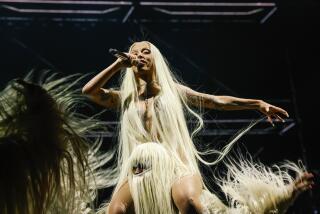Who owns the Electric Daisy Carnival trademark? Dance-scene vets duke it out

Electric Daisy Carnival, the flagship annual festival for the L.A.-based dance-music promoter Insomniac, draws roughly 400,000 fans to the Las Vegas Motor Speedway over three days. It is perhaps the most recognized brand name in American dance music.
However, the rights to the Electric Daisy Carnival trademark are now under dispute.
A pair of complaints filed before the U.S. Patent and Trademark Office seek to revoke Insomniac Holdings’ trademark of that coveted brand.
The complaints were filed by two L.A. electronic music promoters: Stephen Enos, a leading figure in the early L.A. rave scene in the ‘90s, and Gary Richards, founder of Hard Events, another heavyweight name in dance music promotion and a fellow Live Nation-affiliated brand. They each argue that Insomniac founder Pasquale Rotella did not have the right to trademark the name Electric Daisy Carnival, which he has used to promote concerts in Los Angeles, Las Vegas and around the world since 1997.
Even if they are unsuccessful, the petitions could cast some doubt on the origin story of one of dance music’s most prominent events.
When reached for comment on the ongoing trademark complaints, representatives at Live Nation deferred to officials at Insomniac. When reached by phone and e-mail, Insomniac representative Jennifer Forkish acknowledged that the company was aware of the complaints, and said in a statement, “When companies such as Insomniac are successful, their achievements often make them a target for individuals seeking to make easy money — and that’s exactly what the case is here.
“These claims are without merit. What cannot be disputed is that Electric Daisy Carnival’s success is a result of Pasquale Rotella’s vision and hard work and that Insomniac Holdings is the owner of the validly registered Trademarks for Electric Daisy Carnival.”
The complaints are far from the first legal questions surrounding Insomniac and Electric Daisy. Rotella is facing trial in a corruption case involving L.A. Memorial Coliseum, where the Electric Daisy Carnival was staged several times before moving to Las Vegas in 2011 after a 15-year-old girl died of an Ecstasy overdose at the previous year’s festival.
However, even if Enos or Richards could prove they first created the Electric Daisy trademark, a favorable ruling may be difficult to come by, based on the amount of time elapsed since they last claimed to have used the trademark. In trademark law, if a holder does not use a mark for three consecutive years, or make established plans to do so in the future, it is considered to be “prima facie evidence of abandonment,” which means that others could potentially legally use it.
“Trademarks are ‘use it or lose it,’ they’re not like patents, where whoever thinks of it first wins,” said Daniel M. Klerman, a professor at USC’s Gould School of Law. “Even if there’s no doubt that [Richards or Enos] used it first, abandonment is a pretty standard defense. To say, ‘We haven’t used this in 20 years, but we always intended to revive it,’ that’s a hard thing to do.”
Enos filed the first of the two trademark-cancellation petitions in 2013. Enos, now a private chef for tennis stars Venus and Serena Williams, was a dance music event promoter who booked shows under the name Steve Kool-Aid. His events in the late ‘80s and early ‘90s were among the first large-scale raves in Los Angeles.
In the petition, Enos claimed that he conceived of and produced a festival under the Electric Daisy Carnival mantle in 1991 in Pomona as part of his series of parties known as Double Hit Mickey. He said he produced additional events using the Electric Daisy Carnival name and its associated “EDC” abbreviation in 1992 and 1993 before moving onto other projects.
According to Enos’ petition, Rotella later used the Electric Daisy Carnival name without his knowledge to promote a festival at the Coliseum in 1997. Enos claimed that he allowed the festival to continue so as not to disappoint fans in the nascent L.A. dance music scene but that he never intended to relinquish the trademark. Enos’ attorney provided screenshots of previous Insomniac websites that said the name was “borrowed from Steve Kool-Aid’s original creation.”
As Rotella continued to use the trademark through the ‘90s and 2000s, dance music became a lucrative festival phenomenon in America, Rotella first registered the Electric Daisy Carnival trademark in 2002 (he registered “EDC” in 2012, and re-registered “Electric Daisy Carnival” in 2010 ). In 2013, Live Nation invested an estimated $50 million for close to a 50% stake in Insomniac.
“This sounds stupid now in hindsight, but I didn’t want to pile on, and I didn’t want the brand ruined,” Enos said, referring to the negative publicity surrounding the 2010 EDC death and the corruption case. “But when I found out that he’d trademarked it and he was in talks with Live Nation, that’s when he ceased communication with me.”
Enos said he filed the trademark complaint to underline what he saw as ongoing problems with Insomniac’s safety and business practices, and to contest Rotella’s narrative of founding what is currently the largest dance music festival in America. Rotella has a memoir, written with “A Million Little Pieces” author James Frey, planned for a summer release, with film rights owned by Fox 2000.
“We tried to resolve this amicably,” said Enos’ attorney, Christopher L. Rudd. “The reason we went that route here is that Rotella, after convincing Steve to let him use the trademark, just decided he was going to register it in his own name.”
The second complaint, filed April 20 by Hard Events promoter Richards, also seeks to cancel Insomniac Holdings and Rotella’s ownership of the Electric Daisy Carnival trademark. Hard Events produces the popular annual Hard Summer dance music festival in the Los Angeles area, among such other events as the Holy Ship music cruise.
Richards also got his start promoting L.A. raves in the early ‘90s, and he partnered with Enos on an event production company, Double Hit Productions, at the same time.
Richards’ petition says that he and Enos began using the Electric Daisy Carnival trademark in 1991 and that they granted an oral license to Rotella to use the name in 1997. But Richards’ complaint said that he similarly never intended to turn over the rights to the trademark and that the mark belonged to him and Enos.
The petition claims that Rotella “knowingly made a false, material misrepresentation of fact when he filed the Application, with the intent to defraud the United States Patent and Trademark Office by claiming that he was the true owner of the Mark.”
When reached for comment, representatives for Richards and Hard Events said that they were aware of the cancellation petition but that they could not discuss it on the record. April 20 was the five-year incontestability deadline for Richards to file a trademark cancellation complaint against Insomniac.
Enos said that although he was cited as an originator of the Electric Daisy Carnival trademark in Richards’ petition, he was unaware of Richards’ complaint until it was filed.
Neither complaint has an expected resolution date at the Patent and Trademark office. This year’s Electric Daisy Carnival, scheduled for June 19-21 at the Las Vegas Motor Speedway, is again sold out and expected to draw record crowds.
august.brown@latimes.com







